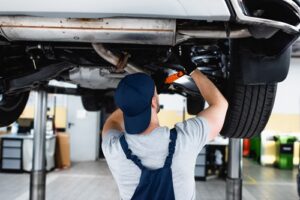
Imagine driving down the road when suddenly, your dashboard lights up with warning signs. It’s natural to feel a bit alarmed, wondering if it’s the engine, the tires, or something else entirely. More often than not, these warnings are due to a sensor malfunction, which may need an auto repair specialist.
In today’s vehicles, sensors play a crucial role in monitoring everything from tire pressure to engine performance. When these sensors go awry, it can be frustrating. However, there are simple steps you can take to address these issues effectively. Let’s dive into essential auto repair tips to help you manage sensor problems efficiently.
Understanding the Role of Sensors in Auto Repair
Sensors are vital components of your vehicle, acting as its eyes and ears. They continuously gather and relay data to your car’s computer, ensuring that everything functions as it should. For instance, sensors help maintain optimal fuel efficiency, monitor tire pressure, and ensure that your brakes operate safely. When these car sensors malfunction, addressing the issue promptly is a crucial part of auto repair to keep your car running smoothly.
Common Car Sensors and Their Importance in Auto Repair
Several key sensors in your vehicle are integral to its operation and require attention during auto repair.
Engine Sensors
Engine sensors are fundamental to your car’s performance. For example, oxygen sensors measure the oxygen levels in your exhaust to ensure the engine runs efficiently. Similarly, mass airflow sensors monitor the air entering the engine, helping to maintain the right air-fuel mixture. When these sensors fail, it can lead to poor engine performance and reduced fuel efficiency, making it essential to address these issues during auto repair.
Tire Pressure Sensors
Tire pressure sensors are part of the Tire Pressure Monitoring System (TPMS). They monitor your tire pressure and alert you if it drops too low. Properly inflated tires are crucial for safety and fuel efficiency. If these sensors malfunction, you might unknowingly drive on underinflated tires, leading to potential hazards. Regular maintenance of these sensors is a key aspect of auto repair.

auto repair in Knoxville TN
Brake Sensors
Brake sensors, especially those in the Anti-lock Braking System (ABS), are crucial for safe braking. A malfunctioning ABS sensor can compromise your braking ability, increasing the risk of accidents. Thus, checking and repairing brake sensors is a vital part of auto repair.
Why Do Sensors Malfunction?
Understanding why sensors fail can help you prevent and address these issues effectively during auto repair in Knoxville TN.
Environmental Factors
Environmental conditions such as extreme temperatures, moisture, and road salt can cause sensors to malfunction. These factors can lead to corrosion or damage, resulting in inaccurate readings or complete sensor failure. Addressing these issues as part of your auto repair routine can prevent more significant problems down the road.
Electrical Problems
Electrical issues, including faulty wiring, loose connections, or blown fuses, are common causes of sensor malfunctions. Sensors rely on electrical signals to communicate with your car’s computer. When these signals are interrupted, it can lead to false warnings on your dashboard. Ensuring your vehicle’s electrical system is in good condition is essential for preventing sensor-related issues during auto repair.
Wear and Tear
Like any car component, sensors wear out over time. Older vehicles are more likely to experience sensor failures due to aging components. Regular auto maintenance and timely replacements are crucial to preventing sensor issues and ensuring your car operates efficiently.
Addressing Sensor Issues: Practical Auto Repair Tips
If your car’s sensors start acting up, there are several steps you can take to resolve the problem effectively.
Use a Diagnostic Tool
Using an OBD-II scanner is one of the most efficient ways to diagnose sensor issues. This tool connects to your car’s diagnostic port and retrieves error codes that indicate which sensors are malfunctioning. This information can help you pinpoint the problem and decide on the appropriate auto repair.
Inspect the Sensors
Sometimes, you should look for signs of damage. Addressing these problems promptly can often fix the malfunction without needing to replace the sensor, making it a cost-effective auto repair in Knoxville TN.
Consult an Auto Mechanic
If you’re not comfortable diagnosing or fixing the issue yourself, consulting a mechanic is a wise choice. Professional mechanics have the tools and expertise to accurately diagnose and repair sensor problems, ensuring your car is safe to drive.
As vehicles become more advanced, the role of sensors will only increase. Staying on top of sensor maintenance and addressing issues promptly through auto repair will help ensure your car remains safe and efficient. Whether it’s keeping sensors clean, checking for electrical issues, or consulting Miller Brothers Transmission Auto Repair and Body Shop, proactive auto repair is key to a reliable driving experience.
Ready to ensure your car’s sensors are functioning perfectly? Contact Miller Brothers Transmission Auto Repair and Body Shop today to keep your vehicle in top shape!
Like our Facebook page for more information about auto services.
Miller Brothers Transmission Auto Repair and Body Shop
7123 Tazewell Pike
Corryton, TN 37721
(865) 689-5072
https://www.millerbrosautorepair.com/
Serving Knoxville, TN and Knox County
Service areas include: All of Knox County, Corryton, Fountain City, Halls Crossroads, Powell and Knoxville

No comments:
Post a Comment